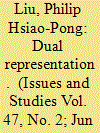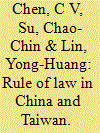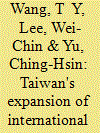| Srl | Item |
| 1 |
ID:
129900


|
|
|
|
|
| Publication |
2014.
|
| Summary/Abstract |
For rationalists, China (PRC)'s current conciliatory policy toward Taiwan is merely "calculative." Hence, Chinese leaders must act patiently with Taiwan to dampen the "China threat theory." This article contends that strategic considerations cannot entirely justify Beijing's Taiwan policy. Given the PRC's steadfast position on reunification, it is unclear why Beijing has, since the 1990s, allowed for a looser construction of the "one China" principle and even tacitly acknowledged the existence of Taiwan's Republic of China (ROC). In line with the constructivist theory of argumentative persuasion, my position stresses that changing discourses have affected Chinese leaders' perceptions of the Taiwan Strait problem. New identities and interests have been reconstituted to redefine the PRC relations vis-à-vis the ROC. While it is unlikely that Beijing would formally accept the ROC, the current trajectory raises hope that cross-strait ties may become more stabilized in the long run.
|
|
|
|
|
|
|
|
|
|
|
|
|
|
|
|
| 2 |
ID:
107693


|
|
|
|
|
| Publication |
2011.
|
| Summary/Abstract |
Current studies of Chinese representation in the United Nations assume that the Republic of China's expulsion was inevitable because of Chang Kai-shek's one China principle and Beings role in U.S. foreign policy. This paper provides another perspective on this event by mapping hoe the United States, using a two Chinas strategy, endeavored to secure Taipei's seat and how Chiang Kai-slick faithfully executed this plan.
|
|
|
|
|
|
|
|
|
|
|
|
|
|
|
|
| 3 |
ID:
106258


|
|
|
|
|
| Publication |
2011.
|
| Summary/Abstract |
This paper argues that Taiwan and China should sidestep the issue of what constitutes "one China" and instead improve the rule of lawin their respective areas, which could lead to a better system of government. One element of a better system is prosperity, which both sides are quite keen on. But the remaining two components- freedom and democracy- cannot be realized without rule of law. Sun Yat-sen's Three Stages of NationalReconstruction offers a viable framework for the development of the rule of law on the two sides of the Taiwan Strait.
The rule of lawinChina is,with a fewnotable differences, at a similar stage of development as it was in Taiwan under martial law. Such a difference in the two governments' legal development could derail their efforts toward closer ties.
China has to overcome many challenges before it can undertake legal reform; however, there is reason to believe and hope that the development and maturation of its legal system will continue. Discussions centered around "clean and efficient government and corporate governance" would help Taiwan and China take the first of many practical steps to accelerate cross-Strait exchange and relations.
|
|
|
|
|
|
|
|
|
|
|
|
|
|
|
|
| 4 |
ID:
101931


|
|
|
|
|
| Publication |
2011.
|
| Summary/Abstract |
While much is to be celebrated since Taiwan President Ma Ying-jeou's inauguration in 2008, cross-Strait relations are not without challenges. One such crucial test is Ma's call for Chinese leaders to stop isolating Taipei in the world community and give Taiwan adequate 'international space'. Because the issue strikes at the heart of the fundamental differences between Taipei's and Beijing's positions regarding the island's sovereignty, it needs to be handled carefully by both governments for better cross-Strait relations. This study analyzes the approaches adopted by both Beijing and Taipei regarding Taiwan's status in the international community. Utilizing discussion with Chinese scholars and government officials and the analysis of several waves of survey data conducted in Taiwan, it argues that Beijing's flexibility in its application of the 'one China' principle and the Ma administration's practicality in making its requests are critical to the realization of Taipei's demand for international space and hence cross-Strait stability.
|
|
|
|
|
|
|
|
|
|
|
|
|
|
|
|